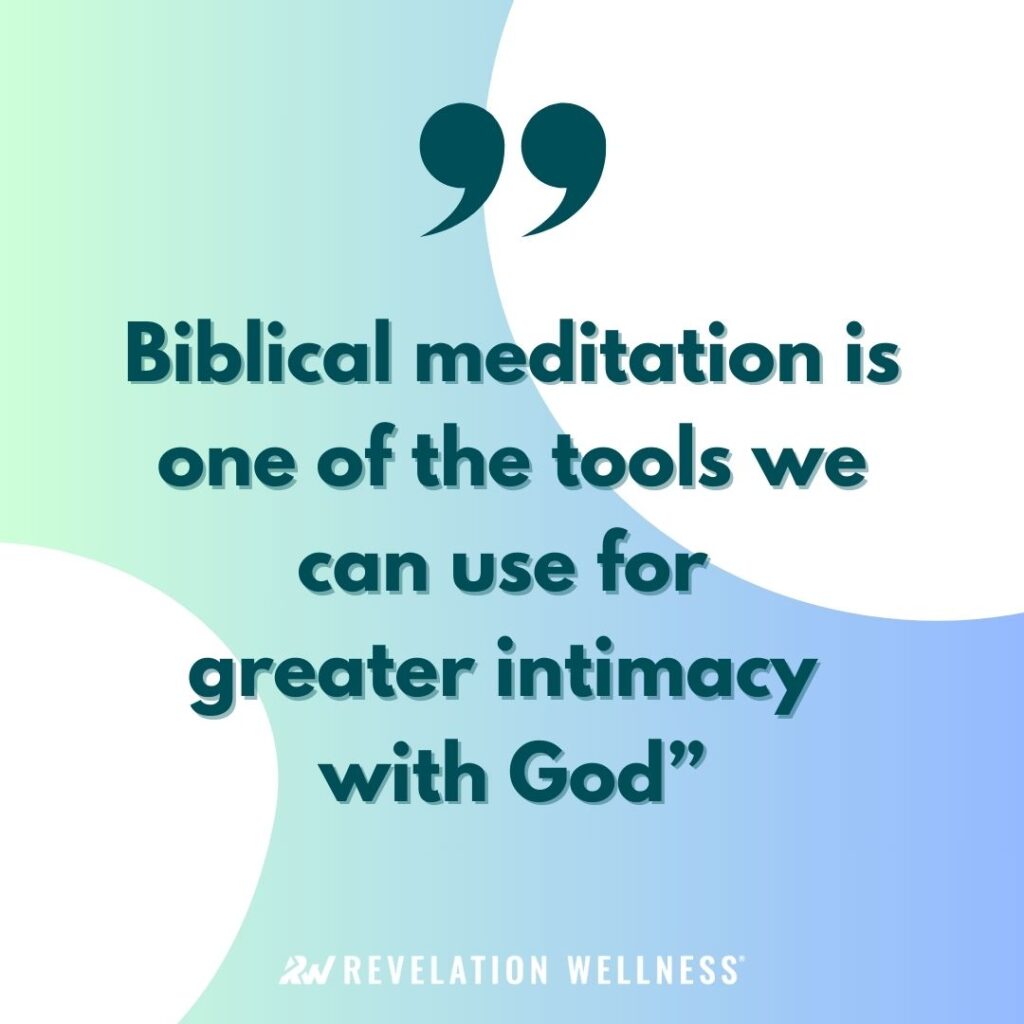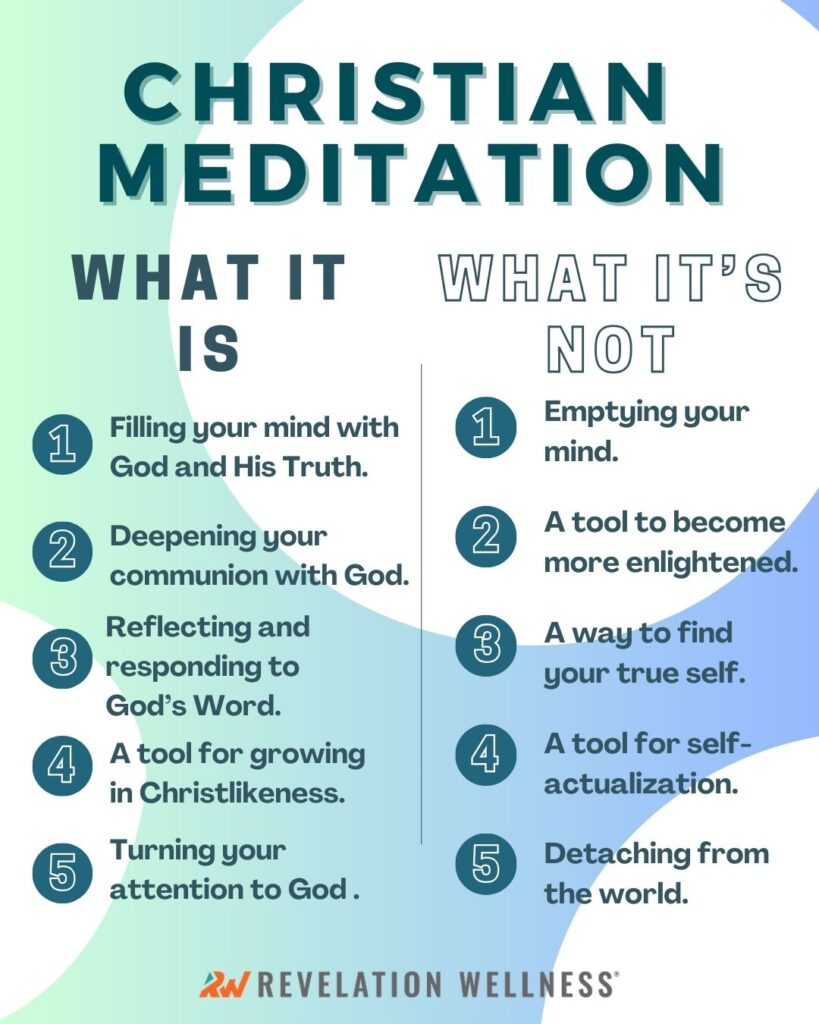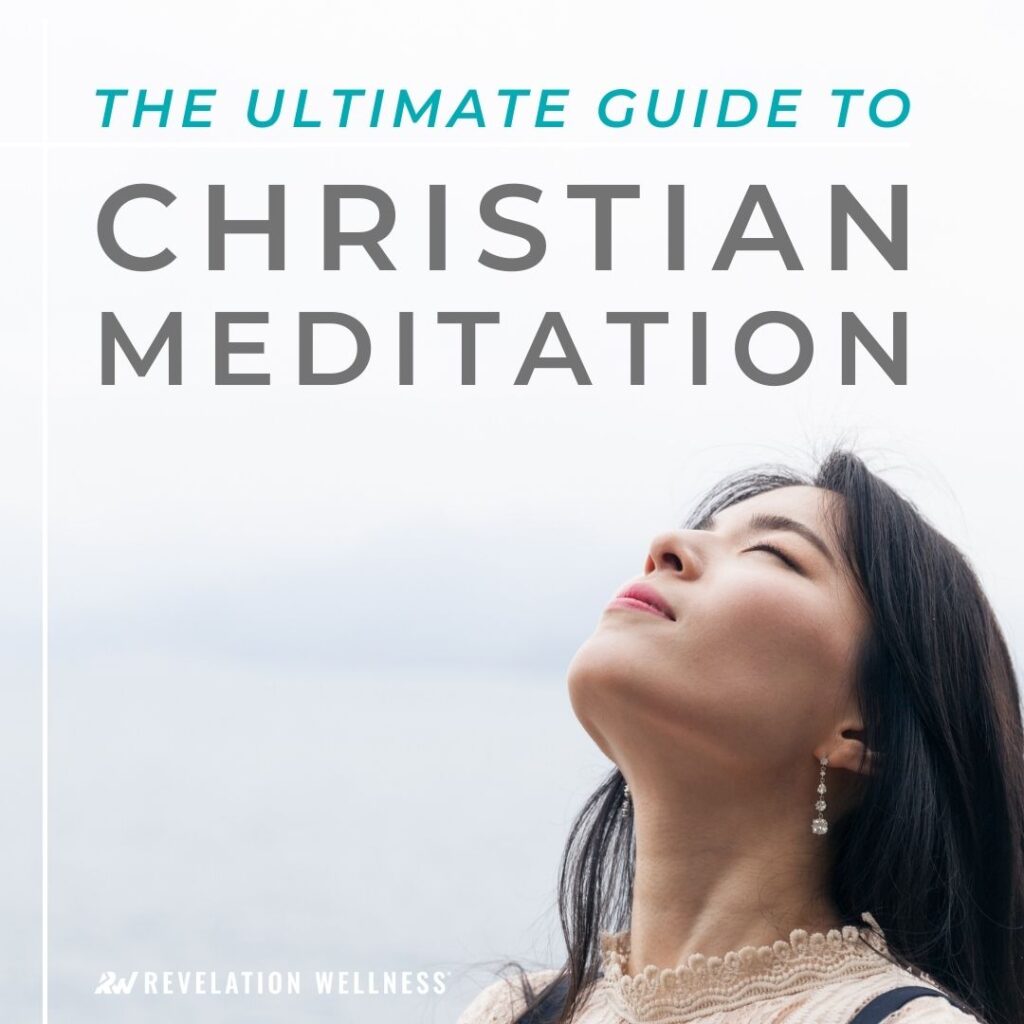Meditation is a buzzword for health, wellness, and spirituality. Learn how the Bible defines meditation for those who follow Jesus.

In today’s world, you’re just as likely to learn about using meditation for fitness performance as you are in a therapy session. You’re also just as likely to hear about meditation in relation to Christianity as you are Eastern religions.
A quick Google search will yield millions of resources related to meditation. Just clicking around on a few will reveal the varied definitions, goals, and applications of meditation.
Where a fitness enthusiast might tout a meditation practice to improve mental focus to power through a workout, a person dabbling in Eastern religion or New Age beliefs might use meditation to connect to the universe or find inner peace.
While you may not think twice about deep breathing or mindfulness techniques to crush your heavy lifting goals, you may take a step back when someone suggests meditation as a spiritual discipline. As well you should.
If you are Christian, looking to honor God with all you do and avoid conforming to the world, then it’s wise to dig deeper into meditation and its appropriate use within the Christian faith.
If you’ve been wondering, is Christian meditation a sin? We’ve got an answer for you.
In this article, you’ll:
– Define Christian meditation according to its biblical usage.
– Learn the differences between Christian and Eastern meditation.
– Learn how Christian meditation helps us abide in Jesus.
What is Christian Meditation?
For the Christian, meditation isn’t a personal journey to self-actualization. It isn’t a quiet quest to discover your true self. It isn’t even primarily a tool to cultivate rest or reduce stress.
Instead, meditation for the Christian is for the purpose of reflecting, remembering, and receiving the Word of God.
As Tim Mackie from the BibleProject shares in the video, “Ancient Jewish Meditation Literature,”
“In Hebrew, the word meditate (hagah) means literally to mutter or speak quietly. The idea is that every day for the rest of your life you slowly, quietly read the Bible out loud to yourself and then go talk about it with your friends, pondering the puzzles, making connections, and discovering what it all means.”
The story of the Bible — from Genesis to Revelation — is so dense and multi-layered that it requires a lifetime of study and a lifetime of meditation — reading, pondering, sharing, discussing, and discovering.
It is in Scripture-driven meditation that we can actually begin to process the knowledge we accumulate through study and find our rest in Him. As Alisa Keeton says, “We are not hungry for lack of knowledge, but for lack of intimacy.”
Thus, biblical meditation is one of the tools we can use for greater intimacy with the Scriptures and ultimately the Father, Son, and Holy Spirit as we process through His Word.

What the Bible says about meditation
The Bible is full of references about meditating on the Scriptures. Here are a few:
“This Book of the Law shall not depart from your mouth, but you shall meditate on it day and night, so that you may be careful to do according to all that is written in it.” – Joshua 1:8
“…but his delight is in the law of the Lord, and on his law he meditates day and night.” – Psalm 1:2
“I will meditate on your precepts and fix my eyes on your ways.” – Psalm 119:15
“On the glorious splendor of your majesty, and on your wondrous works, I will meditate.” – Psalm 145:5
In these verses, and many others, we learn that meditating on Scripture helps us follow God’s law, delight in Him, recall His glory, and fix our eyes on His ways.
Through biblical meditation, we can be like Mary, who treasured all the wonderful things about Jesus in her heart (Luke 2:19).
Christian Meditation vs. Eastern/New Age Meditation
The differences between Eastern or New Age meditation and Christian meditation are significant because they stem from entirely different worldviews. Each tradition’s understanding of God, the self, and the purpose of life shapes how and why meditation is practiced. These foundational beliefs lead to very different methods, goals, and spiritual outcomes.
Though Eastern religions and New Age meditation practices do vary in beliefs, methods, and goals. Generally, the goals of these meditation practices are enlightenment, self-discovery, nirvana, and a connection to the universe.
To achieve these goals, Eastern meditation often employs breathing techniques, repeated mantras, and practices designed to quiet or empty the mind. These methods aim to detach from thoughts, desires, or emotions. Ultimately, this type of meditation tends to center on the self, either through self-awareness, self-mastery, or the pursuit of inner enlightenment.
In contrast, the purpose of Christian meditation is to learn more about God. Thus, the main focus of Christian meditation is to fill the mind with truth from the Bible. This time spent pondering God’s Word deepens our communion with God and allows His Word to form us and shape our lives.
While Christians can use deep breathing techniques and a comfortable sitting posture to meditate on a Scripture passage, they can just as easily meditate on the Bible over coffee with a friend. This is because Scripture meditation is not primarily a practice for peace or stress relief. Christian meditation is first and foremost about God and His Word.
So, you can be confident that when your meditation is rooted in God’s Word and directed toward knowing Him, it is not only not a sin—it is a biblical and life-giving practice.
For more on the difference between Eastern meditation and Christian meditation, read this short article from the C.S. Lewis Institute.

Will Christian meditation get me closer to God?
In Eastern religions like Buddhism and Hinduism, adherents practice meditation (along with many other spiritual practices) as a means to progress spiritually. In these works-based religions, meditation is a discipline on the path to salvation.
In Christianity, there is no concept of levels of attachment to God. We do not meditate for greater unity with God or to earn our salvation.
We are either united to God by our faith in Christ or not. This is the distinction between believers and unbelievers. Believers are united to God by the blood of Christ, and no amount of meditation or spiritual practices we can do can make greater (or lesser) God’s saving work in us (Romans 5:10-11).
Meditating on the Scriptures, then, is not a practice to ascend to a greater spiritual rank, but a practice for deeper communion with God.
Sam Storms defines communion with God as “what is going on day in and day out in my walk with the Lord…my ability to feel his affection, the capacity of the human heart to enjoy being adopted as one of God’s children.”
Communion with God is our day-to-day experiential relationship with him. This is the concept we’re describing when we say, “God’s presence felt so close during that season.” Or, “I felt so far from God that day.”
While we may measure our communion with God according to our emotions. Our mercurial emotions are not the thermostat of our communion with God. Though our experience of God may be something we feel some days, our communion with God involves things we do, like biblical meditation.
In John 15:10, Jesus says, “If you keep My commandments, you will abide in My love, just as I have kept My Father’s commandments and abide in His love.”
Here, abiding with Jesus means “mutual inhabitation, and living, active interpenetration (so to speak) of Christ and His disciples.” This communion, this mutual inhabitation between the believer and Jesus through the Holy Spirit, is connected to keeping God’s commandments.
But, as commentator Charles Ellicott notes, “the keeping of the commandments is not an arbitrary condition imposed upon human love; but a necessary result of love itself.” Because we love God and are loved by God, we keep His commands.
In Psalm 119:23-24, the Psalmist writes, “Though rulers sit together and slander me, your servant will meditate on your decrees. Your statutes are my delight; they are my counselors.”
The Psalmist ponders God’s commands while surrounded by his enemies. Though the words of his enemies were meant to bring him shame and fear, the Word of God covered him in delight and provided him with counsel.
The Word that brought delight to the Psalmist’s heart is the same Word in which God promises to meet us! You can meditate on Scripture in peace, knowing that you are following Jesus’ command to abide in him.
[For more on union and communion with God listen to Revelation Wellness Podcast #983 with John Eldridge on Healing Through Union with God.”
In Summary
Christian meditation is not sinful when practiced for the purpose of reflecting, remembering, and receiving the Word of God as instruction for your life.
Check out the resources below to learn more about Christian meditation and incorporate it into your spiritual rhythms.

Gabrielle Wenos is the Content Coordinator at Revelation Wellness. She loves creating resources to help you strengthen your faith, your body, and your family.

All You need to Know About Christian Meditation
Christian spiritual formation has deep roots in meditation. Jesus himself modeled the importance of regularly withdrawing into solitude.
Check out The Ultimate Guide to Christian Meditation to learn all you need to know about how to practice meditation biblically!
Meditate on Scripture on the Revelation Wellness Podcast!












